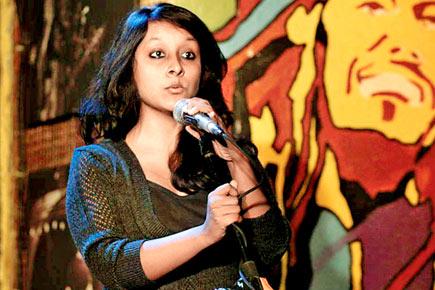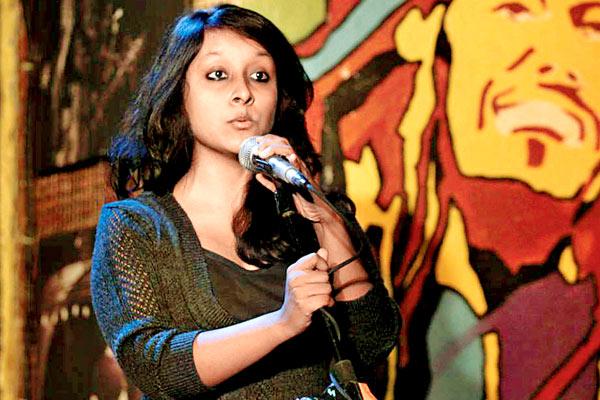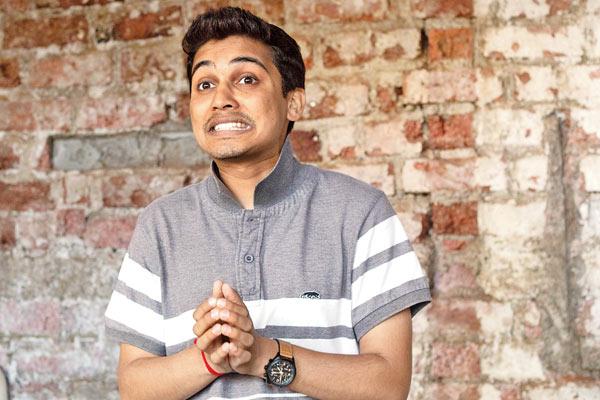You don’t have to be a poet to get on stage and tell your life story in verse. Slam poetry is a rage abroad, and now, Airplane Poetry Movement hopes to help more people discover this powerful, poignant art form. With an India-Pak collaboration, a project on menstruation and a national poetry slam lined up, the initiative has found its voice, says Kareena Gianani

“You must have noticed,” the male voice on the other end of the telephone tells me, “that I have a rather effeminate voice for a 23-year-old.” Deepak Ramola isn’t looking for me to agree, disagree or reassure — he already “owned his story” at a recent poetry slam when he recited ‘I Have Been An Adult All My Life’, which also won the slam competition that evening.

Co-founder of the Airplane Poetry Movement, Nandini Varma
Ramola’s poem was about how he was mercilessly bullied at school because of his voice and how he dealt with the trauma.
Get the Beat right
The slam was organised by Airplane Poetry Movement (APM), a compelling initiative which introduces participants to
spoken word poetry, wherein one writes a poem and performs it on stage. The concept is rather popular in the US, for instance, where Beat writers (American post-WW II writers prominent in the 1950s) such as Allen Ginsberg famously
recorded spoken word. Today, Sarah Kay, Kate Tempest and Saul Williams are some of the prominent international names associated with spoken word.
Now, APM aspires to add younger, Indian voices to the list. In December last year, two 22-year-olds, Nandini Varma and Shantanu Anand, both law students at the ILS Law College Pune, founded APM with the desire to free poetry from its common and unfortunate association — that it is esoteric and not for the young. The duo has been holding two to
five day-long workshops in schools, colleges, cafes and cultural hubs across Mumbai, Delhi, Bangalore and Pune, wherein they first train participants in writing exercises, following which the ‘poets’ write a poem meant to be
performed. APM has conducted sessions in Mumbai at The Hive and the Birdsong Café. Last month, APM conducted workshops at Jai Hind and Xavier’s colleges, and will conduct more sessions this month.

Deepak Ramola, an APM slam winner. PICs COURTESY/Nandini Varma
Poetry is for everybody
“When I first watched a spoken word performance on YouTube, I realised how different it is from the poetry we read in school. It was forceful, poignant and the speakers didn’t write in metre or rhyme. It compelled me to begin an Indian youth-centric movement,” says Varma.
In addition to this ambition, adds Anand, APM seemed the best way to make poetry cool for youngsters. “We want to defy the idea that poetry isn’t for everybody, and give poetry back to the people. For a youngster with a complex inner life, spoken word is more representative than the dumbed-down mainstream media,” he explains.
APM’s youngest spoken word poet was 14, and people have performed on topics ranging from a letter to an Iranian rape survivor, to the love story between a chai and a biscuit, Tom and Jerry’s fictitious landlady, personal demons
and introspective issues. Ramola, who now regularly performs at slams, says a poem flourishes when it is performed. “When I perform my poetry, my pauses, my voice, my hesitation, it enhances my belief in my poetry. APM is far
superior a platform than other slams because their workshops really make you think and write on ideas you’d would have never thought of. The peer feedback is very constructive, too,” he believes.
The road ahead
APM has a busy year ahead. Its recent tie-up with Menstrupedia has translated into boys and girls posting their poems on menstruation on its website, an initiative Anand says is heartening and unique because “how often do boys talk, forget think, about issues around menstruation?” Many also posted videos of themselves performing poems on the recent shooting at Peshawar online. Later this month, APM and a Karachi-based spoken word group, Spoken Stage, will kickstart their association by performing a long poem, jointly written by five Indian and five Pakistani youngsters.
The poem will stress on the need to accept and respect differences in culture and celebrate similarities between the countries.
However, their most ambitious project will take place in July — The National Slam Competition — for which APM will conduct eliminations involving spoken word poets from the four metros in February. “Once we have sponsors and enough manpower, we hope to go smaller towns, too, and help people discover how powerful and liberating spoken word can be. We may not know it, but there’s a poem inside each of us,” smiles Anand.
 Subscribe today by clicking the link and stay updated with the latest news!" Click here!
Subscribe today by clicking the link and stay updated with the latest news!" Click here!







